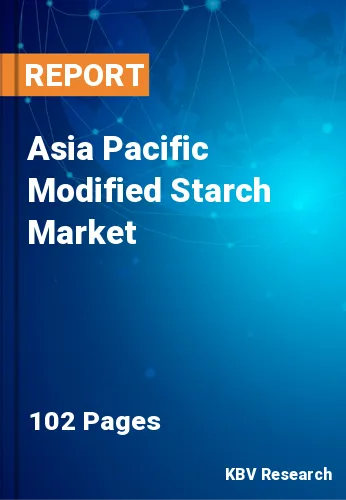The Asia Pacific Modified Starch Market would witness market growth of 4.1% CAGR during the forecast period (2022-2028).
The modern customer expects a simpler, more pleasurable application without a bleaching impact or a thick, sticky layer. After application, tanning products must be more resistant to sand adhesion to the skin. Cosmetics and personal care products made with modified starch are designed to meet the specific needs of consumers.
Fast food restaurants make up an important portion of the food services industry, and their popularity has grown over time as a result of their emphasis on affordable and competitive pricing, combined with rising consumer demand for convenience foods. Over the last few years, a great numerous international fast food restaurant chains have arisen in various areas of the world, each with its own cuisine and product offers to meet consumer demand in different geographies. Fast food restaurants frequently employ modified starch in their food preparations to enhance the texture, flavor, and taste of their dishes.
Convenience food is in high demand among the working population, who have a fast-paced and ever-changing lifestyle. Due to their hectic schedules, many people choose Ready to Cook (RTC) foods or snacks over regular meals. Various convenience food products, such as ready-to-mixes & eats, bakery products, and so on, contain modified starch. The need for modified starch is likely to rise in the near future as the desire for convenience foods rises.
In the Asia-Pacific region, the use of modified starch in a variety of applications is helping to drive growth. It thickens or stabilizes food products, particularly sauces. All modified starches are acceptable to use in APAC and have undergone independent testing to ensure their safety. As a result of the growing market for sauces and condiments, the market for industrial starches is also expanding at a quicker rate. The demand for starch in the region has been pushed by the region's increasing manufacturing industries, which range from textiles to cosmetics. In nations like China and India, the fast-developing processed food sector and a consumer shift toward snacking have been driving the modified starch market. The changing retail scene, as well as the engagement of a slew of global and local firms in the prepared food industry, is expected to enhance demand for modified starches in the region.
The China market dominated the Asia Pacific Modified Starch Market by Country in 2021, and would continue to be a dominant market till 2028; thereby, achieving a market value of $2,060.3 million by 2028. The Japan market is experiencing a CAGR of 3.5% during (2022 - 2028). Additionally, The India market would showcase a CAGR of 4.7% during (2022 - 2028).
Based on Raw Material, the market is segmented into Corn, Potato, Cassava, Wheat, and Others. Based on Application, the market is segmented into Food & Beverages (Bakery & Confectionery, Beverages, and Processed Food & Others), Feed, and Industrial (Paper Making, Weaving & Textiles, Medicines & Pharmaceuticals, Cosmetics, and Others). Based on Form, the market is segmented into Dry and Liquid. Based on countries, the market is segmented into China, Japan, India, South Korea, Singapore, Malaysia, and Rest of Asia Pacific.
Free Valuable Insights: The Worldwide Modified Starch Market is Projected to reach USD 15.1 Billion by 2028, at a CAGR of 3.8%
The market research report covers the analysis of key stake holders of the market. Key companies profiled in the report include Archer-Daniels-Midland Company, Cargill Corporation, Ingredion, Incorporated, Tate & Lyle PLC, Royal Avebe U.A., Roquette Freres SA, Emsland Group, KMC Ingredients Company, Tereos S.A., and Royal Ingredients Group B.V.
By Raw Material
By Application
By Form
By Country
Our team of dedicated experts can provide you with attractive expansion opportunities for your business.

